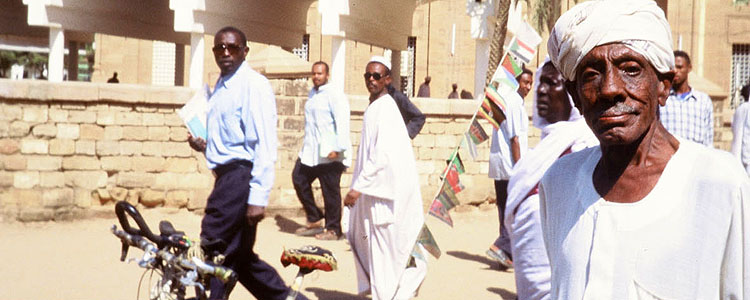None of the parts has been beaten through a military way, but this war between the north Muslim government and the Christian rebels of the south had the highest cost: two millions of dead people and more than four million of refugees and exiles.
Sudan has a population of 35 millions of inhabitants; more than the half of it are the African black race. The official language is Arabic and the 70 % of its population is Muslim and they are in the north of the country. There are more than 500 ethnics with more than 100 dialects and they practise aborigine religions and as well as Christianity.
The country was independent from the United Kingdom in 1956 and there was a peace period between 1971 and 1983, but then, another war started, which conflict was caused by the Muslim government imposition of the Sharia or the Islam law in the country.
None of the parts has been beaten through a military way, but this war between the north Muslim government and the Christian rebels of the south had the highest cost: two millions of dead people as a consequence of combats, starving and illnesses; and more than four million of refugees and exiles.
Actually, for a lot of people the Sharia is a legal system of discrimination and injustice. The south of the country is too poor due to the fact that there isn’t any infrastructure, education or there aren’t any roads, people try to settle down in the north of the country. But there, they have to face another kind of inequality: poverty is also affected by religion. For instance, to look for a job, to send their children to school, to have some medical treatment, to get some food or to be judged by law. People, who are not Muslim, have more problems.
That is to say, for example; a Christian man who was condemned to death penalty, received the proposal to convert him to Islam to save his life, but he rejected it.
Islam law justifies a lot of things, among them, the Yihad or Holy War: the fact of fighting against infidel in the name of God. According to the Sudanese penal code; if a single woman is a pregnant, she will be punished as she had had illegal sexual relations (zina), and most times she can be sentenced to 100 lashes. For instance, Mahasin Abaker Fadul, a fifteen-year-old girl, whose lawyer appealed against this sentence, based on the fact that as a pregnant, she was not in condition to receive that punishment. However, it was confirmed by the Supreme Court.
Nowadays, after more than twenty years of war, international pressure to finish with this conflict is increasing. The Muslim government and the Christian rebels are negotiating for abolishing the Sharia in the south of the country, which isn’t an easy task.
Rebels want to be independent, but in the last years oilfields were found, and most of them in the south; for this reason, civil war was worse, due to that oil means one thousand million of dollars of annual income for the Government.
It will not be an easy task to reach peace in Sudan, but both parts are engaged to succeed in doing this. Let’s hope so.


